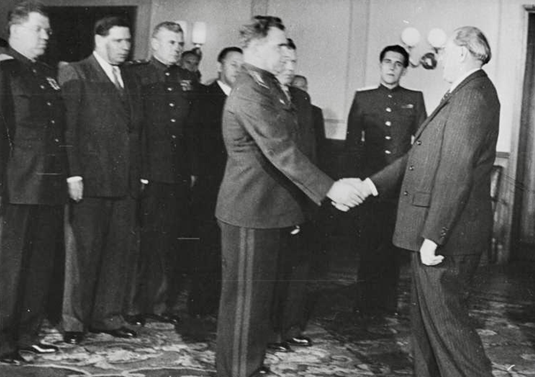Re-Opening the University of Jena, 16 October 1945
- Maria A. Kithcart

- Mar 13, 2025
- 2 min read
Updated: May 26, 2025

Pictured: Colonel General V.I. Chuikov (left) at the opening of the University of Jena, Germany, October 1945.
During World War II, Germany suffered extensive destruction due to relentless Allied bombing campaigns, fierce ground battles, and the eventual occupation of its territory. Major cities such as Berlin, Hamburg, and Dresden were heavily bombed, reducing entire neighborhoods to rubble and causing significant civilian casualties. The bombing of Dresden in February 1945 by the British, for example, resulted in a massive firestorm that devastated the city and killed tens of thousands. Infrastructure, transportation networks, and industrial centers were left in ruins, crippling the nation's economy.
As Soviet forces advanced from the east and Western Allies pushed from the west, intense fighting further devastated urban areas, with the Battle of Berlin marking the final, catastrophic collapse of Nazi Germany. By the war’s end in May 1945, Germany was left in a state of ruin, with millions displaced, food shortages widespread, and its cities resembling wastelands of destruction and despair.
The aftermath of World War II not only reshaped Germany’s political and economic landscape but also had a profound impact on its educational institutions. As part of the Soviet-occupied zone, Marshal Zhukov appointed Colonel General V.I. Chuikov to serve as the Chief of the Soviet Military Administration of Thuringia. During this time (from July 1945 – June 1946), the region underwent significant structural and ideological changes.
Among the institutions affected was the University of Jena, officially known as Friedrich Schiller University Jena, founded in 1558. As one of Germany’s oldest and most prestigious universities, it has long been a center of intellectual thought and is associated with famous historical figures including Karl Marx (who defended his dissertation at the institution). In the post-war period, the university, like the rest of the region, was subject to Soviet policies, which aimed to reshape education to remove elements of fascism. Paul S. Bodenman reflected on these transformations in his work Education in the Soviet Zone of Germany, shedding light on the university’s role in this new era of reconstruction and ideological realignment:
“The University of Jena was the first to reopen after the War, 16 October 1945. Procedures were not radically different from those followed in the Western Zones. […] Before an institution could be opened, the faculty and proposed courses of study were screened by the Soviet authorities, libraries were examined, and other steps were taken to eliminate Nazism, nationalism, and militarism.” (93)

In the wake of World War II, Germany faced not only physical devastation but also profound political, economic, and ideological transformations. The destruction of its cities, infrastructure, and institutions left the country in a state of disarray, necessitating extensive rebuilding efforts under the oversight of the occupying Allied forces. In the Soviet-occupied zone, these changes extended beyond physical reconstruction to include sweeping reforms in governance, education, and society. The University of Jena, like many other institutions, became a focal point for ideological realignment as Soviet authorities sought to reshape the academic landscape to align with their vision for post-war Germany. The war’s impact on Germany was not only measured in the ruins of its cities but also in the redefinition of its institutions and identity, setting the stage for the nation’s eventual division and the emergence of two distinct German states.



